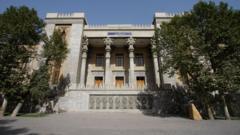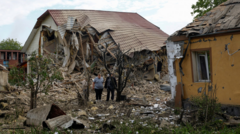Amid ongoing nuclear negotiations, Iran's Supreme Leader Ayatollah Ali Khamenei expresses doubt about reaching a successful agreement with the US, citing excessive demands and a lack of trust. Tensions escalate as both sides maintain firm positions on uranium enrichment amid conflicting interpretations of past agreements and threats of military action.
Iran's Supreme Leader Skeptical of Progress in US Nuclear Negotiations

Iran's Supreme Leader Skeptical of Progress in US Nuclear Negotiations
Ayatollah Ali Khamenei voices concerns over the possibility of a breakthrough in nuclear talks with the United States, deeming their demands excessive.
Iran's Supreme Leader, Ayatollah Ali Khamenei, has expressed skepticism regarding the ongoing nuclear negotiations with the United States, indicating that the discussions are unlikely to yield a fruitful agreement. In recent comments, he criticized the US for making "excessive and outrageous" demands related to uranium enrichment, a critical element in the negotiations.
Khamenei stated, "We don't think it will lead to any outcome," signaling a lack of faith in the talks. This statement comes in light of US President Donald Trump’s previous assertion that Iran had "sort of" agreed to the terms of a new deal, following four previous rounds of discussions mediated by Oman since April.
Ahead of another negotiation session scheduled for this weekend, Iran's chief negotiator rebuffed Trump's claims that Iran would have to recommit to halting the production of enriched uranium. This form of uranium can be utilized for both reactor fuel and nuclear weapons, leading to heightened global tensions.
Trump’s administration has threatened military action against Iran should negotiations fail, further complicating the situation. Nevertheless, Iran maintains that its nuclear pursuits are entirely peaceful and that it will never entertain the development or acquisition of nuclear weaponry. However, Iran has breached restrictions set forth in previous nuclear agreements in response to severe US sanctions reinstated seven years ago, now stockpiling enough highly enriched uranium for potential bomb creation.
During a ceremony commemorating the late President Ebrahim Raisi, Khamenei reminisced about Raisi’s hardline stance against engaging in direct talks with the US, emphasizing the importance of not allowing “enemies” to dictate terms at the negotiating table. Khamenei dismissed previous negotiations under former moderate President Hassan Rouhani as unsuccessful and predicted no better outcome under his reformist successor, Masoud Pezeshkian.
Khamenei also criticized the tone of US officials in the talks, advising them to refrain from making "nonsensical remarks" regarding Iran’s enrichment capabilities.
In response to an interview with US special envoy Steve Witkoff, who asserted that the US could not permit any level of enrichment, Iranian Foreign Minister Abbas Araqchi countered by stating that such unrealistic expectations would disrupt negotiations, reiterating that Iran's enrichment is non-negotiable.
The complexity of these negotiations is deepened by the historical context surrounding the 2015 nuclear deal, which was designed to limit Iran's nuclear initiatives while ensuring regular inspections in exchange for relief from sanctions. Under this agreement, Iran was restricted to enriching uranium to a maximum of 3.67% purity – suitable for civilian nuclear energy. In recent months, the International Atomic Energy Agency has reported that Iran has amassed substantial reserves of uranium enriched to 60%, pushing it near the threshold for potential bomb manufacturing capabilities.




















